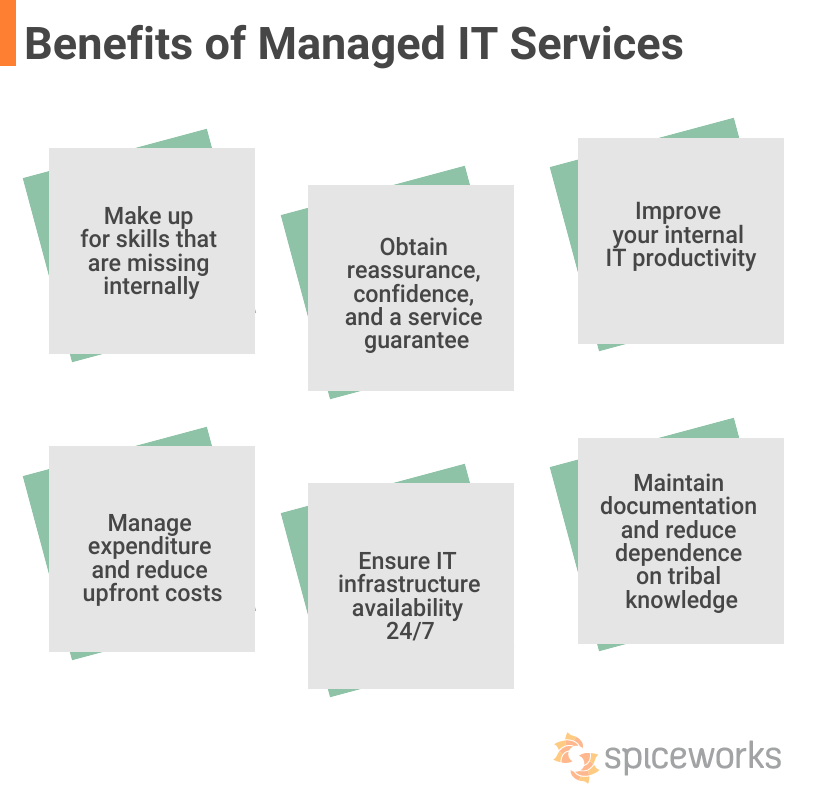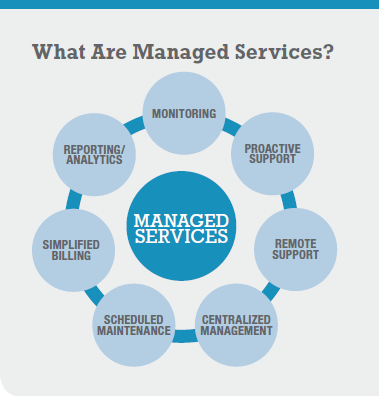A recent study by MarketsandMarkets projects that the managed services market is expected to grow from $275.5 billion in 2023 to $372.6 billion by 2028.
This remarkable growth underscores a significant shift in how businesses approach IT management. Managed IT services offer a solution that alleviates the burden of managing complex IT systems, allowing businesses to focus more on their core operations and less on technological challenges.
As Resultant VP of Technology and MSP Solutions AJ Watson says, “Managed IT services are not just support systems; they’re strategic tools for carving out a business’s success story.”
By understanding what managed IT services are, companies can make informed decisions about leveraging them for enhanced efficiency and competitiveness.
Managed IT Services Definition
Managed IT services are comprehensive solutions provided by an external organization to handle a company’s IT needs.
This includes monitoring, managing, and resolving IT issues within a business. The goal of these services is to maintain a smooth and efficient IT operation, ensuring that technology supports the business objectives rather than being a source of stress or distraction.

Source: Spiceworks
The Role of Service Level Agreements (SLAs) in IT Managed Services
SLAs are formal agreements that define the scope, quality, and responsibilities of the managed IT services provided. They offer clear expectations and benchmarks for service delivery, ensuring accountability and alignment with business needs.
Tired of constantly putting out IT fires?Let Resultant handle your IT challenges with expertise and ease. |
How Managed Services Work
Managed services operate on a proactive model, unlike traditional break-fix IT support.
Providers of managed services use advanced tools and expertise to monitor IT infrastructure constantly, identifying and resolving potential issues before they escalate into major problems. This approach reduces downtime and ensures the continuity of business operations.
| Feature | Traditional IT Support | Managed IT Services |
| Approach | Reactive; responding to issues as they occur | Proactive; monitoring and preventing issues before they arise |
| Cost | Often unpredictable, costs vary based on repairs and emergencies | Predictable; usually a fixed monthly fee |
| Expertise | Limited to in-house knowledge or ad-hoc external support | Access to a team of experts with diverse, specialized skills |
| Technology | May lag behind the latest advancements due to cost or resource constraints | Regular updates to the latest technology and trends |
| Security | Basic; dependent on in-house capabilities | Advanced; includes regular updates and monitoring |
| Scalability | Limited; depends on existing in-house resources | Highly scalable; services can be adjusted based on business needs |
| Focus | Diverts business focus to IT issues | Allows businesses to focus on core activities |
| Compliance | Often managed internally; can be challenging | Compliance expertise provided, ensuring adherence to regulations |
What Is an IT Managed Services Provider?
An IT managed services provider (MSP) is a company that offers a range of IT services under a contractual agreement.
These providers bring a wealth of experience and resources that most businesses would find difficult to maintain in-house. MSPs offer tailored services that fit the unique needs of each business, ranging from network management to cybersecurity and cloud services.
Types of Managed Services
Managed IT services often cover a wide spectrum of IT services including, but not limited to:

Source: CompTIA
- Remote Monitoring and Management of Servers: This service involves continuous oversight and administration of a company’s servers, ensuring they operate efficiently and securely. It helps in identifying and resolving issues promptly, minimizing downtime and maintaining optimal performance.
- Cloud Computing: Cloud computing services offer businesses scalable and flexible access to computing resources like servers, storage, and applications over the internet. This enables companies to reduce the costs associated with maintaining physical infrastructure while enhancing collaboration and data accessibility.
- Technical Support: Technical support provides businesses with expert assistance for a variety of IT-related issues ranging from software troubleshooting to hardware repairs. This service ensures that any technical problems are quickly addressed, reducing disruption to business operations.
- Cybersecurity: Cybersecurity services protect businesses from digital threats including malware, ransomware, and cyberattacks. These services encompass regular security assessments, implementation of protective measures, and ongoing monitoring to safeguard sensitive business data.
- Infrastructure Management: Infrastructure management involves overseeing and maintaining the essential IT systems that support business operations such as networks, data centers, and telecommunications. This ensures that the IT infrastructure is robust, efficient, and able to support the business’s current and future needs.
- Mobile Device Management: Mobile device management (MDM) involves managing and securing a company’s mobile devices such as smartphones and tablets. MDM policies help in controlling device access to corporate networks, safeguarding data, and ensuring compliance with regulatory standards.
Pros of Managed IT Services
- Cost Savings: Managed IT services help businesses reduce costs by eliminating the need for a full-time IT staff. They offer a more predictable expense model, usually based on a fixed monthly fee, allowing for better budget management.
- Access to Latest Technology: Businesses benefit from the latest technology and tools without the need for significant investments. Managed IT service providers typically keep up with the latest IT trends and advancements, ensuring clients have access to modern solutions.
- Expert Support: MSPs bring a team of experienced and skilled IT professionals who provide expert support. This level of expertise is often difficult for businesses to maintain in-house, especially for small to medium-sized enterprises.
- Improved Security: With cybersecurity being a major concern, MSPs offer robust security services, including regular updates, monitoring, and risk assessments. This helps in protecting sensitive data and complying with regulatory standards.
Cons of Managed IT Services
- Dependency on Service Provider: Businesses may become reliant on their MSP for critical IT functions. This dependency can be a concern if the service provider faces issues like downtime, changes in management, or service quality degradation.
- Concerns about Control: Handing over IT operations to an external provider can lead to concerns about losing control over certain aspects of the business’s IT infrastructure and decision-making.
- Potential for Limited Customization: While MSPs offer a range of services, their solutions might not always be fully customizable to meet specific business needs. This can be a limitation for businesses with unique or specialized IT requirements.
- Risk of Data Privacy Issues: Entrusting sensitive business data to an MSP involves a certain level of risk, particularly in terms of data privacy and compliance with industry-specific regulations.
| More resources you might like: |
Who Can Benefit from Managed IT Services?
1. Small and Medium-Sized Businesses (SMBs)
SMBs often have limited resources and may not have the capacity to staff a full IT department. Managed IT services provide these businesses with access to a team of IT experts, offering the same level of service a larger company might have in-house, but at a more manageable cost.
These services allow SMBs to focus on their core business activities without being sidetracked by IT issues. Managed IT services can handle everything from basic tech support to advanced cybersecurity, ensuring that the technology needs of small and medium businesses are met efficiently.
2. Businesses with Strict Industry Regulations
Certain industries—like healthcare, finance, and legal—face stringent regulatory requirements regarding data handling and privacy. Managed IT services help ensure that businesses in these sectors comply with these regulations through enhanced security measures and constant monitoring.
Managed service providers often have expertise in specific industry regulations and can help businesses navigate the complex landscape of compliance. This includes managing risk assessments, data protection protocols, and audit support, which are crucial for businesses in highly regulated industries.

3. Businesses Looking for Cost-Effective IT Services
Businesses seeking to reduce their IT costs without sacrificing quality can benefit significantly from managed IT services. These services provide a predictable cost model, typically through a fixed monthly fee, which helps in budget planning and eliminates unexpected IT expenses.
Managed IT services offer scalability, allowing businesses to adjust the level of service based on their changing needs. This flexibility ensures that businesses only pay for what they need, making it a cost-effective solution for companies of all sizes, especially those looking to optimize their IT spending.
Helping Businesses Like Yours Grow for Over 15 Years
Managed IT services can make a big difference in reducing your costs and workload, especially when you find the right IT partner. The key is to look for someone who really understands what you need and wants to build a strong, long-term relationship.
Resultant distinguishes itself as the leading provider managed IT services provider in Atlanta, Dallas, and Indiana, boasting over 15 years of expertise.
| Explore our range of IT Services: |
Garnering trust from more than 200 IT managed services clients and serving over 700 customers worldwide, our track record speaks to our commitment to excellence.
Our commitment to responsive support and comprehensive services has established us as a trusted partner in IT management, serving businesses in key locations such as Indianapolis and Fort Wayne in Indiana, Denver, CO, and across several cities in Texas, including Dallas, Fort Worth, Irving, Garland, Plano, and Arlington, as well as Atlanta, GA.
Reach out to us for a free consultation today and discover how we can contribute to the success and growth of your business.
Share:







